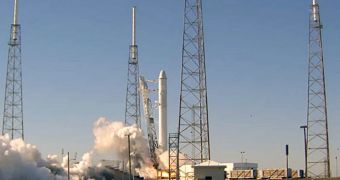Officials at the Space Exploration Technologies Corporation (SpaceX) announced that they will be delaying the maiden flight of the unmanned Dragon space capsule to December 9 at the earliest.
The decision was made following concerns about one of the engine nozzles on the Falcon 9 medium-lift delivery systems, which engineers at the company want to deal with before giving the go-ahead.
The Hawthorne, California-based company is about to launch the first privately-built space capsule into low-Earth orbit (LEO), under a $1.6 billion contract it signed with the American space agency.
Under the terms of the NASA Commercial Orbital Transportation Services (COTS) program, if SpaceX manages to demonstrate Dragon's capabilities, then the company will be allowed to fly some 12 resupply missions to the International Space Station (ISS).
But the same contract also states that the corporation needs to demonstrate these capabilities in a first flight carried out in 2010, so SpaceX cannot afford to let this launch attempt slip into 2011.
NASA officials say that they are OK with another launch attempt as soon as tomorrow, December 8. The company still has until this weekend to send Dragon on its maiden flight to LEO.
“As it turns out, in the final review of closeout photos, we found some indications on a second stage nozzle that we're spending some time investigating,” explained in a press conference the SpaceX President, Gwynne Shotwell.
Engineering teams are currently “doing test and root cause analysis,” the official added. If the nozzle can't be fixed, and needs replacing, then SpaceX will most likely schedule another launch attempt for Friday or Saturday.
The issue discovered on the Falcon 9 engine nozzle affects the rocket's second stage. The delivery system has been brought down in a horizontal configuration yesterday, so that teams could get access to the affected area.
According to Shotwell, photographic evidence reveals “porosity, potential cracking in a weld joint” on the nozzle. During the harsh conditions of launch, the weld could break, with potentially catastrophic consequences.
The Falcon 9 is currently located at Launch Complex 40, a facility at the Cape Canaveral Air Force Station (CCAFS), in Florida. The Air Force base is located right next to the Kennedy Space Center.
Representatives from both SpaceX and NASA showed an united front, declaring jointly that, in spite of these setbacks, they still believe in the ultimate success of the collaboration, Space reports.
“This is a test flight. It is not in any way an indictment for or against the program if you have anomalies,” said the NASA Headquarters acting director of commercial space flight development, Phil McAlister.
“If history is any guide, you're not going to have a completely successful test flight program,” he added.
“No matter how this test flight goes, NASA and SpaceX both are committed to the success of this program. We're committed to this partnership. If there are any anomalies, we are going to learn from them, move forward and continue to demonstrate these systems,” he concluded.

 14 DAY TRIAL //
14 DAY TRIAL //